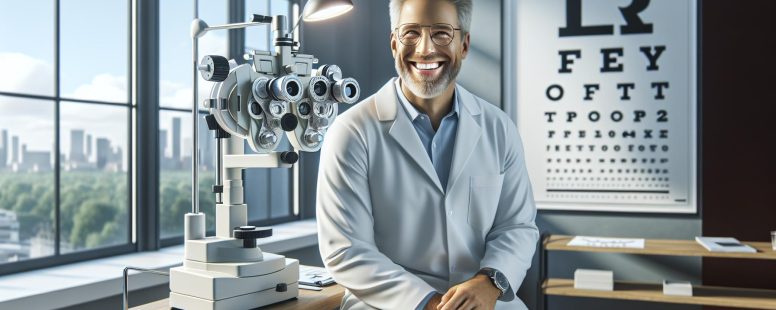Optometrist Versus Ophthalmologist: Understanding the Key Differences in Eye Care Specialists
Your eyes are your window to the world, but when vision problems arise, knowing who to turn to can feel overwhelming. Should you visit an optometrist or an ophthalmologist? While both are eye care professionals, their roles, training, and expertise differ in ways that might surprise you. Understanding these distinctions can make all the difference in protecting your sight.
Imagine struggling with blurry vision or eye discomfort and wondering if it’s something routine or a sign of a deeper issue. The answer lies in choosing the right specialist for your needs. Whether it’s a routine eye exam, prescription glasses, or advanced surgical care, knowing who does what can save you time and ensure your eyes get the best possible care.
Understanding The Difference
Knowing the distinction between optometrists and ophthalmologists helps address your specific eye care needs efficiently. Each professional has unique qualifications, responsibilities, and focus areas.
What Is An Optometrist?
An optometrist is an eye care professional focused on primary vision care. Holding a Doctor of Optometry (OD) degree, they specialize in routine eye examinations, prescribing glasses or contact lenses, and diagnosing common eye conditions like dry eyes or refractive errors (e.g., myopia or astigmatism).
They can also detect diseases like glaucoma or cataracts and manage non-surgical treatment for some conditions. For example, if you experience blurry vision, an optometrist might recommend corrective lenses after a detailed assessment.
What Is An Ophthalmologist?
An ophthalmologist handles more advanced eye care, including surgeries. With medical degrees (MD or DO) and additional specialized training, they diagnose and treat complex disorders like macular degeneration or diabetic retinopathy.
Ophthalmologists perform procedures like LASIK, cataract removal, or retina surgeries. You might visit them if your condition requires medical or surgical intervention, such as sudden vision loss or severe eye trauma.
Both roles contribute significantly to your eye health, ensuring comprehensive care tailored to various concerns.
Education And Training
Understanding the educational and training differences between optometrists and ophthalmologists helps clarify their distinct roles. Their training paths differ significantly in duration, focus, and specialization.
Training Path For Optometrists
Optometrists earn a Doctor of Optometry (OD) degree after completing undergraduate studies. This usually takes about four years. Most pursue a bachelor’s degree in a related field like biology or pre-med before entering optometry school.
Optometry programs include coursework in anatomy, optics, and disease management. Clinical training is incorporated to develop hands-on skills for eye exams, lens prescriptions, and managing conditions like glaucoma. Optional residency programs—12 to 24 months—allow specialization in areas like pediatric optometry.
Training Path For Ophthalmologists
Ophthalmologists complete extensive training. After earning a medical degree (MD or DO), you undertake four years of medical school. Post-graduate training involves a one-year internship, followed by an ophthalmology residency lasting three years.
Residency focuses on surgery, diagnostics, and the treatment of complex conditions like cataracts and retinal detachments. Sub-specialization, through fellowships, requires an additional one to two years, targeting areas like cornea transplants or neuro-ophthalmology.
Scope Of Practice
Understanding the scope of practice distinguishes optometrists from ophthalmologists, helping you better choose the right professional for your eye care needs. Their services differ significantly based on training, tools, and expertise.
Services Provided By Optometrists
Optometrists concentrate on primary vision care and non-surgical treatments. They conduct routine eye exams, helping detect refractive errors like nearsightedness and astigmatism. By prescribing eyeglasses or contact lenses, they enhance your vision clarity.
They diagnose and manage eye conditions such as glaucoma, dry eyes, and diabetic retinopathy. Optometrists also provide pre- and post-operative care for eye surgeries like LASIK, though they don’t perform the surgeries themselves. For example, if your vision blurs and a routine check reveals signs of cataracts, the optometrist refers you to a surgeon while handling your follow-up care.
Services Provided By Ophthalmologists
Ophthalmologists specialize in advanced medical and surgical eye care, making them essential for complex conditions. They perform surgeries for cataracts, retinal detachments, and corneal transplants, restoring vision and relieving pain.
Plus to surgery, they treat chronic diseases like macular degeneration and uveitis. They often use advanced imaging technologies, such as optical coherence tomography, to diagnose retinal issues. If you require vision correction through procedures like PRK or implantable lenses, an ophthalmologist carries out these interventions.
These professionals can also address eye injuries and perform reconstructive surgeries. For instance, if an eye trauma results in a fractured orbital bone, an ophthalmologist manages the treatment and reconstructive care.
When To See An Optometrist
See an optometrist for routine eye examinations and vision correction needs. They assess general eye health, detect conditions like astigmatism or farsightedness, and prescribe glasses or contact lenses to improve vision clarity.
Visit an optometrist for symptoms such as blurry vision, headaches from eyestrain, or difficulty focusing on objects. These signs can indicate refractive errors or the need for updated corrective lenses.
Consult an optometrist for pre- or post-operative care when undergoing non-complex eye procedures like LASIK. They monitor recovery and ensure optimal healing after surgery.
Address eye conditions, such as dry eyes or mild infections, with an optometrist. If you experience persistent irritation or redness, they provide treatments or medications to alleviate discomfort.
Detect early signs of chronic disorders. Optometrists screen for issues like diabetic retinopathy or glaucoma but refer patients to ophthalmologists if surgical interventions become necessary.
Rely on their expertise for vision therapy. Optometrists can design exercises to improve eye coordination or address juvenile conditions such as lazy eye.
When To See An Ophthalmologist
You see an ophthalmologist for complex eye conditions and specialized treatments. Unlike optometrists, they manage both medical and surgical issues affecting the eyes. Severe vision problems, eye injuries, or advanced diseases often require their expertise.
- Chronic Eye Diseases: Conditions like glaucoma, macular degeneration, or diabetic retinopathy demand specialized care. For example, an ophthalmologist monitors disease progression and performs necessary surgical interventions.
- Eye Surgeries: They conduct procedures like cataract removal, retinal detachment repairs, or corneal transplants. If non-surgical treatments fail for conditions such as severe cataracts, surgical options become crucial.
- Sudden Vision Changes: Experiencing sudden loss of vision, flashes of light, or floating spots (floaters) indicates potential retinal detachment or other emergencies. These require immediate consultation with an ophthalmologist.
- Ocular Trauma: Significant injuries like chemical burns or deep corneal abrasions risk permanent damage. Ophthalmologists provide advanced treatments to prevent complications and preserve sight.
- Complex Eye Health Issues: Rare genetic disorders or extreme refractive errors often surpass optometric care. Advanced diagnostic techniques and therapies make specialized expertise essential.
When deciding to consult, always base it on the severity or complexity of your symptoms. For example, see an ophthalmologist if you’re managing degenerative conditions or need intricate surgical procedures. Their training ensures precise diagnoses and tailored care.
Conclusion
Choosing between an optometrist and an ophthalmologist depends on your specific eye care needs. By understanding their distinct roles and expertise, you can ensure your eyes receive the care they deserve. Whether you’re managing routine vision concerns or addressing more complex conditions, selecting the right professional is key to maintaining optimal eye health. Prioritize your vision by making informed decisions and seeking the appropriate specialist when necessary.
- Squarespace Versus Wix: A Comprehensive Comparison - November 23, 2025
- Alternatives To Breezy HR - November 23, 2025
- LCD Versus OLED: Choosing the Right Display Technology - November 23, 2025







